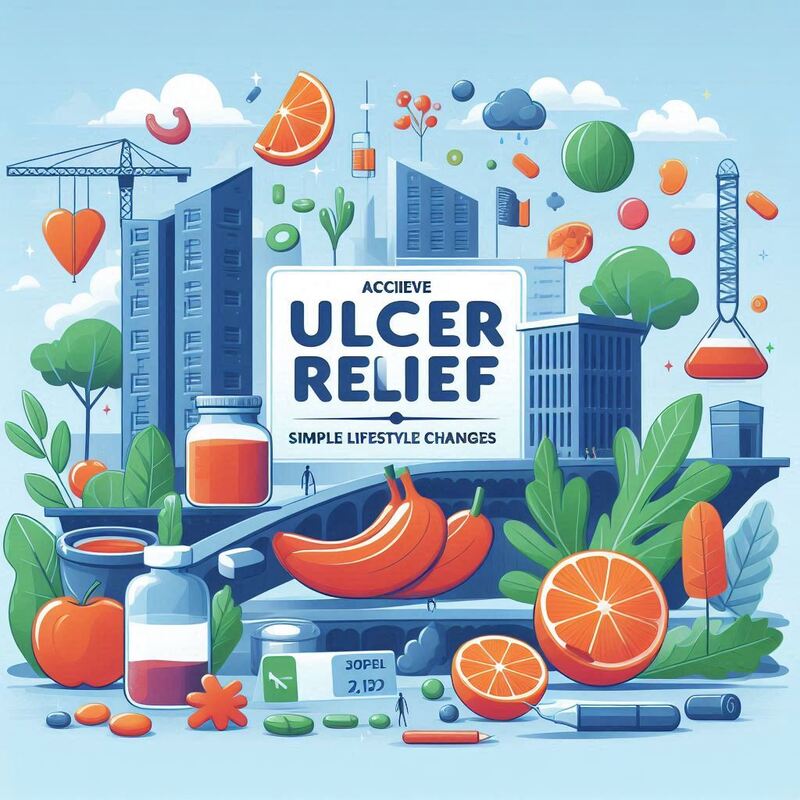Achieve Ulcer Relief
Achieve Ulcer Relief
Transformative Lifestyle Adjustments
Introduction: Ulcers, whether peptic or gastric, are a source of significant discomfort for millions worldwide. While medication plays a crucial role in managing symptoms, achieving lasting relief often necessitates embracing transformative lifestyle changes. In this comprehensive guide, we delve into the realm of ulcer management through simple yet effective lifestyle adjustments, offering practical insights and evidence-based strategies to alleviate symptoms and foster healing. Achieve Ulcer Relief
Understanding Ulcers: Ulcers are open sores that develop on the lining of the stomach, small intestine, or esophagus. These lesions result from the erosion of the protective mucous membrane barriers, leaving the underlying tissues vulnerable to digestive acids and other irritants. The most common types of ulcers include gastric ulcers, which form in the stomach lining, and duodenal ulcers, which occur in the upper portion of the small intestine.
Achieve Ulcer Relief
Various factors contribute to ulcer development, including:
- Helicobacter pylori (H. pylori) infection: This bacterium is a primary cause of peptic ulcers, disrupting the protective mucous layer and triggering inflammation.
- Nonsteroidal anti-inflammatory drugs (NSAIDs): Prolonged use of NSAIDs such as aspirin, ibuprofen, and naproxen can irritate the stomach lining and increase the risk of ulcer formation.
- Smoking: Tobacco use not only weakens the stomach’s protective mechanisms but also impairs ulcer healing and exacerbates symptoms.
- Alcohol: Excessive alcohol consumption can irritate the stomach lining and worsen ulcer symptoms, delaying healing and complicating management.
- Stress: While stress alone doesn’t cause ulcers, it can exacerbate symptoms and interfere with the healing process.
Lifestyle Changes for Ulcer Relief: Achieve Ulcer Relief
- Dietary Modifications:
- Embrace a Balanced Diet: A diet rich in fruits, vegetables, whole grains, lean proteins, and healthy fats provides essential nutrients for digestive health and supports ulcer healing.
- Avoid Trigger Foods: Identify and eliminate foods that trigger or exacerbate ulcer symptoms, such as spicy foods, acidic fruits, caffeine, and high-fat dishes.
- Opt for Smaller, Frequent Meals: Consuming smaller meals throughout the day reduces the burden on the digestive system and helps prevent excessive acid secretion. Aim for regular meal times and avoid eating large, heavy meals, especially before bedtime.
- Stress Management:
- Practice Relaxation Techniques: Engage in stress-reducing activities such as meditation, deep breathing exercises, progressive muscle relaxation, or mindfulness meditation.
- Establish Work-Life Balance: Strive to maintain a healthy balance between work, personal life, and leisure activities. Set realistic goals, prioritize tasks, and delegate responsibilities when necessary to minimize stress.
- Seek Support: Don’t hesitate to reach out to friends, family members, or mental health professionals for support and guidance during stressful periods.
- Quit Smoking and Alcohol Moderation: Achieve Ulcer Relief
- Smoking Cessation: Quitting smoking is essential for ulcer management and overall health. Consider enrolling in a smoking cessation program, using nicotine replacement therapies, or seeking counseling to quit successfully.
- Limit Alcohol Consumption: If you drink alcohol, do so in moderation. Limit intake to no more than one drink per day for women and two drinks per day for men, as excessive alcohol consumption can exacerbate ulcer symptoms and impede healing.
- Hydration and Exercise:
- Stay Hydrated: Drink plenty of water throughout the day to maintain hydration and support optimal digestive function. Limit consumption of caffeinated and carbonated beverages, as they can irritate the stomach lining.
- Incorporate Regular Exercise: Engage in moderate physical activity such as walking, swimming, cycling, or yoga to improve circulation, reduce stress, and promote overall well-being. Aim for at least 30 minutes of exercise most days of the week.
- Quality Sleep: Achieve Ulcer Relief
- Establish a Bedtime Routine: Create a relaxing bedtime routine to signal to your body that it’s time to wind down and prepare for sleep. Avoid stimulating activities, such as watching TV or using electronic devices, before bedtime.
- Create a Comfortable Sleep Environment: Ensure your bedroom is conducive to sleep by keeping it cool, dark, and quiet. Invest in a comfortable mattress and pillows to support restful sleep.
- Prioritize Sleep Hygiene: Maintain a consistent sleep schedule, even on weekends, to regulate your body’s internal clock. Avoid caffeine and heavy meals close to bedtime, and limit exposure to screens emitting blue light, which can disrupt sleep patterns.
Conclusion: Ulcers can significantly impact one’s quality of life, but with the right lifestyle modifications, relief is attainable. By adopting a balanced diet, managing stress effectively, quitting smoking, moderating alcohol consumption, staying hydrated, engaging in regular exercise, and prioritizing quality sleep, individuals can alleviate symptoms, promote ulcer healing, and improve overall well-being. Remember, consistency is key, and small changes can lead to significant improvements in ulcer management and long-term health.
